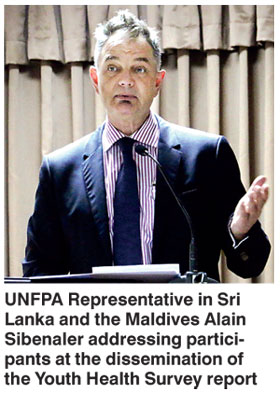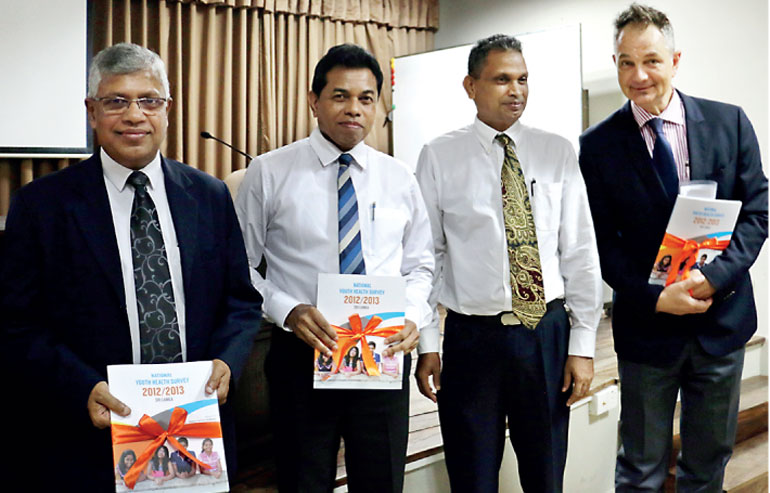Wednesday Feb 25, 2026
Wednesday Feb 25, 2026
Tuesday, 4 October 2016 00:02 - - {{hitsCtrl.values.hits}}
In Sri Lanka, young people aged 15 to 24 years constitute 15.6% of the total population. This means that for every 100 people there are nearly 16 young people. With such a large youth cohort, it is of the utmost importance for the Government, health service providers and policymakers to make focused investments and provide opportunities to ensure that young people progressively develop the knowledge, skills and resilience needed for a healthy, productive and fulfilling life.
The Youth Health Survey of 2012-2013 is an island-wide report that provides a holistic understanding about the health issues of  young people in Sri Lanka. It reveals important data and information on young people’s knowledge, life skills and behaviours related to their physical activity, substance abuse, violence, diet and sexual reproductive health.
young people in Sri Lanka. It reveals important data and information on young people’s knowledge, life skills and behaviours related to their physical activity, substance abuse, violence, diet and sexual reproductive health.
The findings from the National Youth Health Survey were disseminated this morning, at an event organised by the Ministry of Health and the Family Health Bureau, with the support of the United Nations Population Fund (UNFPA) in Sri Lanka and the United Nations Children’s Education Fund (UNICEF) in Sri Lanka.
Speaking at the event, Secretary of the Ministry of Health Anura Jayawickerama stated: “Youth are a large portion of the Sri Lankan population. Therefore, the findings of this survey will be useful not only for the Ministry of Health but also for the other Ministries in making informed decisions. I appreciate the support extended by UNFPA in addressing the prevalent issues that affect the youth of our country.”
The Director General of Health Services, Dr. Palitha Mahipala, said: “The data from this report will provide valuable insight to policymakers on the importance of prioritising adolescent health in Sri Lanka. Also, it is important to consult more young people in understanding what their health needs are to make our approach more youth-friendly.”
The Youth Health Survey reveals that while youth are aware of their own reproductive system, they have significantly low knowledge on the reproductive system of the opposite sex. According to the findings, nearly 50% of male youth reported “don’t know” for items on menstrual cycles, while approximately 60-65% of girls reported “don’t know” for items on anatomy and physiology of the male reproductive system.
Focusing on the importance of sexual reproductive health in young people, Alain Sibenaler, UNFPA Representative in Sri Lanka and the Maldives, said: “It is imperative that we ensure accessibility of sexual reproductive health services for all young persons around the island. We will continue to work closely with the Government to ensure the implementation of an integrated youth-friendly reproductive health services program, and in re-positioning comprehensive reproductive health education in Sri Lanka.”
A presentation on the dissemination of the findings of the Youth Health Survey 2012-13 was shared by Dr. Manjula Dhanansuriya, Consultant Community Physician. Other dignitaries at the event included the Deputy Director General of Public Health Services, Dr. Lakshman Siyambalagoda, Director Maternal and Child Health, Dr. S. Dhamapala, ministry officials, health professionals, academia and resource persons.
 From left: UNICEF Program Officer - Dr. Deepika Atygalle, Deputy Director General of Public Health Services - Dr. Lakshman Siyambalagoda, Director General of Health Services - Dr. Palitha Mahipala, UNFPA Representative in Sri Lanka and the Maldives - Alain Sibenaler, Secretary of the Ministry of Health - Anura Jayawickerama and Director Maternal and Child Health - Dr. S. Dhamapala
From left: UNICEF Program Officer - Dr. Deepika Atygalle, Deputy Director General of Public Health Services - Dr. Lakshman Siyambalagoda, Director General of Health Services - Dr. Palitha Mahipala, UNFPA Representative in Sri Lanka and the Maldives - Alain Sibenaler, Secretary of the Ministry of Health - Anura Jayawickerama and Director Maternal and Child Health - Dr. S. Dhamapala